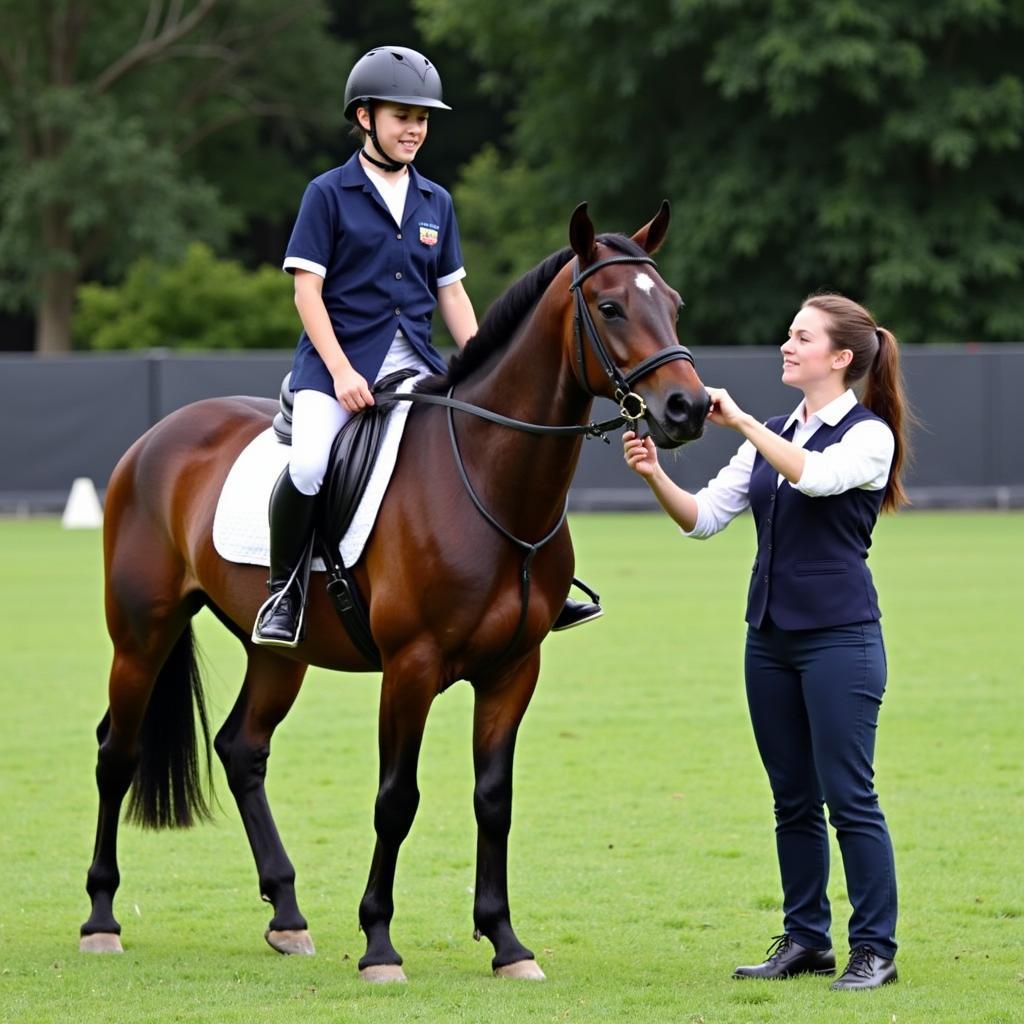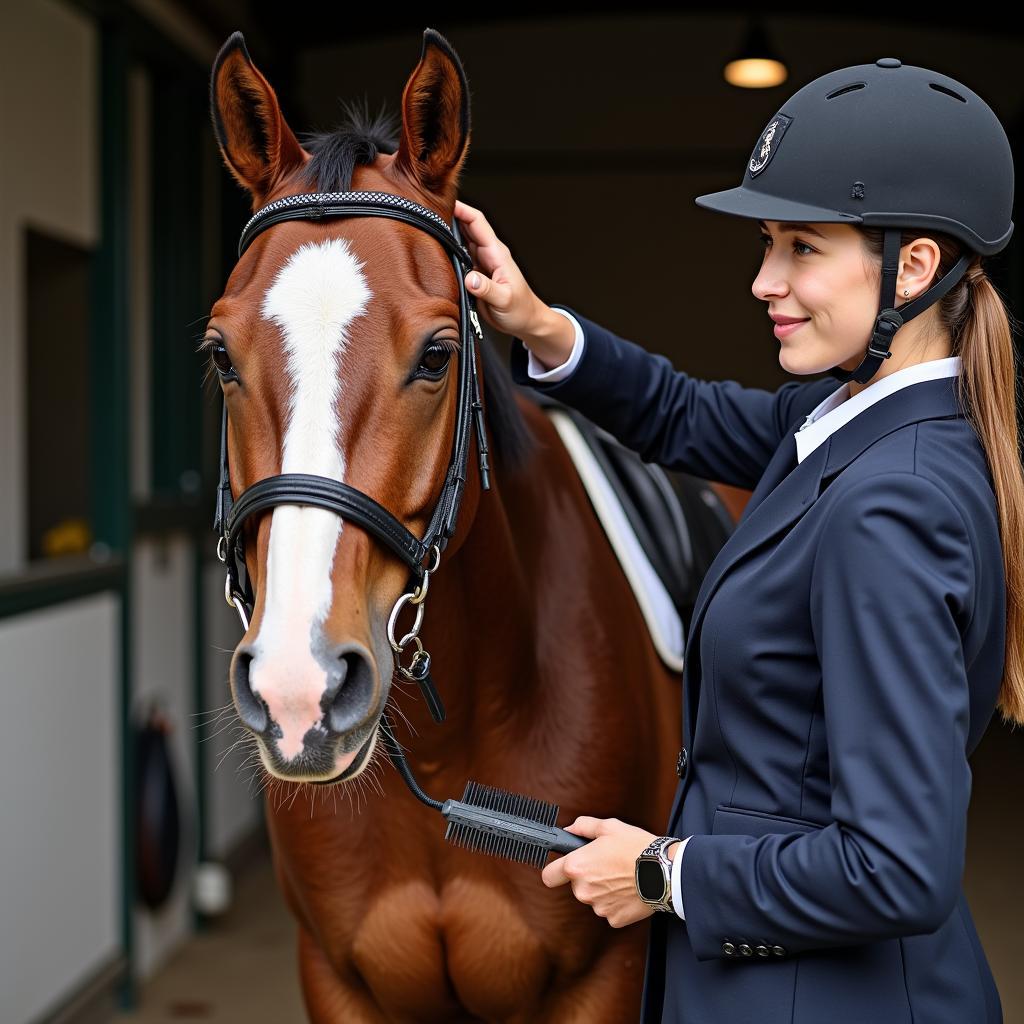Professional Horse Rider careers represent the pinnacle of equestrianism, demanding dedication, skill, and a deep connection with horses. This journey involves far more than simply riding well. It requires a comprehensive understanding of horse care, training techniques, and the competitive landscape. This guide explores the essential aspects of becoming a professional horse rider, providing insights into the path to success.
As an aspiring professional horse rider, one of the first considerations is finding the right match with your equine partner. Understanding their temperament and riding style is crucial for success. matching horse
Essential Skills for a Professional Horse Rider
Professional horse riding encompasses various disciplines, from dressage and jumping to racing and reining. While the specific skills vary, some core competencies remain universal. These include:
- Exceptional Riding Ability: This seems obvious, but it’s much more than just staying on the horse. It involves precise control, balance, and the ability to communicate effectively with the animal.
- In-Depth Horse Care Knowledge: A true professional understands equine anatomy, physiology, nutrition, and health management. They can recognize signs of illness or distress and provide appropriate care.
- Training Expertise: Professional riders often train their own horses, necessitating a deep understanding of learning theory, conditioning, and behavioral modification.
- Business Acumen: Managing finances, sponsorships, and competition schedules requires strong organizational and business skills.
- Discipline and Dedication: The path to professional riding demands unwavering commitment, long hours, and the ability to persevere through setbacks.
Building Your Foundation: Training and Education
The journey to becoming a professional horse rider typically begins with consistent training from a young age. Finding a reputable instructor specializing in your chosen discipline is crucial. This mentor will guide your development, provide feedback, and help you refine your skills.
- Structured Lessons: Regular lessons provide a framework for learning proper technique, building muscle memory, and developing a deeper understanding of horse behavior.
- Specialized Clinics and Workshops: Attending clinics and workshops led by renowned professionals offers valuable insights and exposure to advanced techniques.
- Formal Education: While not always mandatory, pursuing equine studies or related degrees can provide a solid foundation in horse science and management.
 Professional Horse Rider Training Image
Professional Horse Rider Training Image
Navigating the Competitive World of Professional Riding
The competitive landscape is challenging. Success requires more than just talent; it demands strategic planning, meticulous preparation, and a resilient mindset.
- Selecting Competitions: Choosing appropriate competitions based on your skill level and the horse’s capabilities is essential for gradual progression and building confidence.
- Developing a Competition Strategy: A well-defined strategy, including warm-up routines, performance goals, and contingency plans, can help manage pressure and optimize performance.
- Building a Support Network: A strong support system of trainers, grooms, veterinarians, and family members is vital for navigating the demands of professional riding.
Knowing how to control a horse, especially when it starts rearing, is crucial for any professional horse rider. Learn more about how to handle a horse and rider rearing.
The Business of Being a Professional Horse Rider
Professional riding isn’t just about passion; it’s also a business. Managing finances, securing sponsorships, and marketing yourself effectively are essential for long-term success.
- Financial Planning: Developing a comprehensive budget that accounts for training, travel, veterinary care, and other expenses is crucial for financial stability.
- Sponsorship Acquisition: Securing sponsorships can significantly offset the costs associated with professional riding. Building a strong brand and demonstrating consistent performance are key to attracting sponsors.
- Self-Promotion: In today’s digital age, self-promotion through social media and other online platforms is essential for building a following and attracting opportunities.
“Effective communication between horse and rider is paramount in any discipline. It’s not just about giving commands; it’s about understanding your horse’s responses and building a true partnership.” – Dr. Emily Carter, Equine Veterinarian and Performance Coach
Maintaining Horse Well-being: A Professional’s Responsibility
A true professional prioritizes the well-being of their horses above all else. This includes providing proper care, ensuring appropriate training methods, and recognizing when rest and recovery are needed.
- Routine Veterinary Care: Regular check-ups, vaccinations, and dental care are essential for maintaining optimal health.
- Nutritional Management: Providing a balanced diet tailored to the horse’s individual needs is crucial for supporting performance and overall well-being.
- Rest and Recovery: Recognizing signs of fatigue and incorporating adequate rest periods into the training schedule is essential for preventing injuries and burnout.
Understanding the different types of horse equipment, like the horse bit shank, is essential for a professional horse rider.
 Professional Horse Rider Horse Care Image
Professional Horse Rider Horse Care Image
Conclusion
Becoming a professional horse rider is a demanding yet rewarding journey. It requires dedication, perseverance, and a deep passion for horses. By focusing on developing essential skills, building a strong foundation in training and education, navigating the competitive world strategically, and prioritizing horse well-being, aspiring riders can strive towards achieving their professional goals. Professional horse rider careers offer incredible opportunities to pursue a passion, connect with remarkable animals, and achieve excellence in the equestrian world. Remember that consistent effort and a genuine love for horses are the cornerstones of success in this fulfilling career.
FAQ
- How long does it take to become a professional horse rider? The timeline varies depending on individual talent and dedication, but it typically takes years of consistent training and experience.
- What are the physical requirements for professional horse riding? Professional riders need strength, balance, coordination, and endurance.
- What qualifications do I need to be a professional horse rider? Formal qualifications aren’t always required, but relevant education and certifications can be beneficial.
- How much does it cost to become a professional horse rider? The costs associated with training, competition, and horse care can be substantial.
- How do I find a good horse riding instructor? Research local stables and seek recommendations from experienced riders.
- What are the different career paths for professional horse riders? Professional riders can specialize in various disciplines, including dressage, jumping, racing, and training.
- What are the risks involved in professional horse riding? Horse riding carries inherent risks of injury, so safety precautions are essential.
If you need assistance or more information, contact us: Phone Number: 0772127271, Email: [email protected]. Or visit us at: QGM2+WX2, Vị Trung, Vị Thuỷ, Hậu Giang, Việt Nam. We have a 24/7 customer support team.